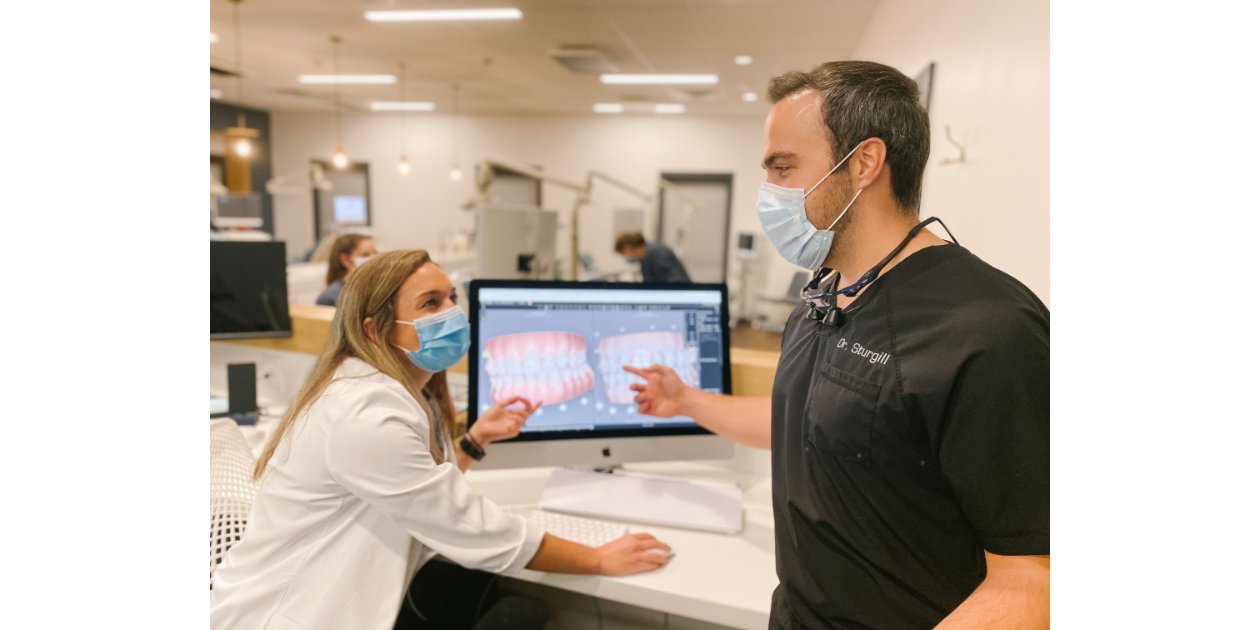Thinking about getting braces? You might wonder, “Will these change how I talk?” It’s a question we often hear at Sturgill Orthodontics, especially from our younger patients and their parents in Johnson City and Norton. Let’s face it: wearing something new in your mouth could make you talk funny. But here’s some good news: it’s not as big a deal as you think. In this blog, we’re looking at braces and speech. Dr. Sturgill, Dr. Williams, and Dr. Harper can help you smoothly transition into speaking confidently with braces.
Understanding How Braces Work
Braces are excellent when you think about it. They’re made of durable brackets and wires. Dr. Sturgill, Dr. Williams, or Dr. Harper will attach them to your teeth. At first, they’ll feel a bit tight. That’s because they’re moving your teeth toward a better position. Don’t worry. Braces have been helping unveil new smiles for decades.
You might wonder, “Will the braces in my mouth get in the way of talking?” It’s a valid question. When you first get braces, they might feel a bit awkward – noticeable but not necessarily disruptive. Your tongue and lips might need time to get used to your new braces. But we design our braces to be as unobtrusive as possible. And before you know it, you’ll hardly notice they’re there.
Initial Adjustments to Braces
Like any new adventure, your first few days in braces might feel a little shaky. That’s totally normal. When braces first come into your life, they bring a few changes, especially how you feel things in your mouth. It’s not just the physical presence of the brackets and wires. You may also find that your tongue and lips take time to adjust to them.
Initially, you might develop a lisp or feel like you’re speaking differently. This is to be expected. Your mouth is just getting acclimated to your braces. There might be slight discomfort or a feeling of awareness when you speak. But don’t worry, this is just a temporary phase. Your mouth is adaptable and will soon learn to work around your braces.
For most people, this adjustment period is short-lived. You’ll find that within a week or two, you’re speaking just as you did before, maybe even forgetting that you have braces. It’s all about giving yourself time and grace to get used to the new normal.
Braces and Speech – The Reality
So, let’s tackle the big question: Do braces change how you talk? Here’s the straight talk – while braces might cause a bit of a stir in your speech initially, it’s a brief and minor adjustment for most people. The truth is, your mouth is a quick learner!
When braces come on board, they don’t typically bring long-term changes to your speech. You might notice a slight difference during the first week or two. Your voice might not sound 100% the same. Certain words or sounds will be different. You may feel like you’re enunciating more than usual. But this is just your mouth’s way of getting in tune with your braces.
What can you do about these changes to your speech? How can you learn to talk around your braces? Dr. Sturgill, Dr. Williams, and Dr. Harper have some tips for you!
Tips for Easing into Speaking with Braces
Adjusting to speaking with braces can be a breeze with the right approach. Here are some tips from our Sturgill Orthodontics team to help you get comfortable:
Practice Makes Perfect
Like any new skill, practice is vital. Try reading out loud or having more conversations. The more you talk, the quicker your mouth will adapt to your braces.
Slow and Steady
Initially, speak slowly. This gives your tongue and lips time to find their way around the braces and reduces the chances of a lisp.
Tongue Twisters
Believe it or not, tongue twisters can be great practice! They help improve articulation and get your mouth muscles used to moving differently.
Stay Hydrated
A dry mouth can make speaking with braces more challenging. Keep hydrated to help your mouth move more freely.
Check for Adjustment
If you’re finding it particularly hard to speak, it’s worth visiting our Sturgill Orthodontics team. We may need to adjust your braces.
Remember, any initial speech changes do not last forever. With some patience and practice, you’ll speak confidently and clearly in no time!
Special Cases: Lingual Braces and Speech
In addition to metal and clear braces, Sturgill Orthodontics also offers inBrace lingual braces. Lingual braces are unique braces that our team places behind your teeth. They’re a fantastic option for those who prefer a more discreet look. But you might wonder, “Do these hidden braces affect how I talk?”
Since lingual braces are closer to your tongue, they might take a bit more getting used to. During the initial days, your tongue might bump against them more often, affecting certain sounds, especially those like ‘s’ and ‘th.’ It’s like getting a new pair of shoes. They’ll take some getting used to. But after a little while, you won’t even notice them.
The good news is that your mouth adapts quickly, like with metal or clear braces. Most people find that within a few weeks, they’re speaking as smoothly as ever. And the best part about InBrace? No one even knows you’re wearing braces while you’re chatting away!
Professional Support and Guidance
Dr. Sturgill, Dr. Williams, and Dr. Harper want you to feel comfortable and confident about your new braces treatment. Think of your braces as a simple stepping stone. The smile you’ve been waiting for is just around the corner. Metal, clear, or lingual braces can help get you there. So whether you’re in Johnson City or Norton, your Sturgill Orthodontics team has what you need. Visit us here to schedule your free consultation.


